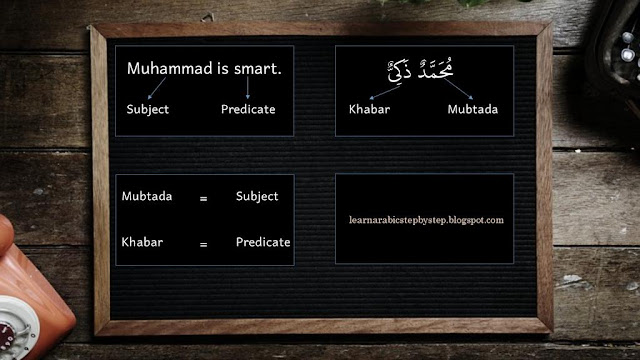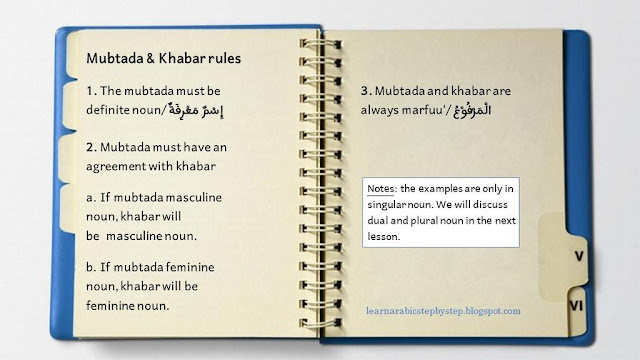Examples of Subject and Predicate in Arabic | with exercise & answer
Table of Content [View]
In this lesson, you will learn Subject (mubtada) and Predicate (khabar) concept, mubtada and khabar rules, make a simple sentence using mubtada and khabar. In addition to this, you will have some exercises in order to comprehend the material.
Subject and predicate in English
Notice the following sentence: "Muhammad is smart."
This sentence has a common pattern, Muhammad is called Subject whereas smart is called Predicate.
In English, the first part of the sentence is Subject, and the second part that contains information about Muhammad being smart is the Predicate.
Subject and predicate in Arabic
Let's consider the Arabic.
In Arabic, the subject of the sentence is called mubtada' (مُبْتَدَأٌ) whereas the predicate is named khabar (خَبَرٌ).
Mubtada generally comes at the beginning of the sentence while khabar comes at the second part of the sentence.
Therefore Muhammad is acted as mubtada' and smart is acted as khabar.
===============More Examples===============
I recommend you to read Mubtada & Khabar Examples.
The lesson contains : mubtada khabar basic concept, the variation of mubtada and khabar in jumlah ismiyyah, sentence examples, and the i'rab of the sentence.
===============More Examples===============
Recap of the concept
1. Muhammad is smart.
Muhammad = Subject
Smart = Predicate.
2. مُحَمَّدٌ ذَكِيٌّ
مُحَمَّدٌ = مُبْتَدَأٌ
ذَكِيٌّ = خَبَرٌ
The rules of mubtada' and khabar
1. The mubtada must be a definite noun (إِسْمٌ مَعْرِفَةٌ).
If you want to comprehend more about the noun (definite noun, common noun/indefinite noun, etc) read these first:
- Noun in Arabic
- Definite & indefinite noun in Arabic
Example:
The man is smart.
In Arabic, we say: الرَّجُلُ ذَكِيٌّ
2. Mubtada must have an agreement with khabar, consequently, if the mubtada is feminine, then the khabar is also feminine.
Example:
Maryam is smart.
In Arabic: مَرْيَمُ ذَكِيَّةٌ
Please consider that in this tutorial, I only focus on singular noun. I will explain the addition rules regarding dual and plural noun in the next lesson.
In this lesson, notice that:
a. If mubtada singular masculine noun, khabar will be singular masculine noun.
b. If mubtada singular feminine noun, khabar will be singular feminine noun.
3. Mubtada and khabar are always marfuu' (الْمَرْفُوْعُ).
It means mubtada and khabar bears dammah ( ُ ) or tanwin dammah ( ٌ ).
Dammah or tanwin dammah are indication of marfuu' for singular noun. We will discuss another indication for dual and plural noun, etc. in the next lesson.
Addition note:
To change a noun to its feminine form, just add the ta marbuta/the round taa (ة) to the end of the word.
ذَكِيٌّ is masculine form, so the feminine form of ذَكِيٌّ is ذَكِيَّةٌ .
The next section is doing exercise. You should try to answer the question, then check your answer against the key answer below.
But before doing the exercise, let me show you word list you should memorize. Please read and memorize them. The questions are taken from these lists.
The vocabulary list
جَمِيْلٌ means beautiful.
لَذِيذٌ = delicious.
مُجْتَهِدٌ = hard-working.
كَبِيْرٌ = big.
حَادٌّ = sharp.
صَغِيْرٌ = small.
طَوِيْلٌ = long; tall
قَصِيْرٌ = short.
شُجَاعٌ = brave.
بَعِيْدٌ = far.
قَرِيْبٌ = near.
كَعْكٌ = cake.
حُلْوٌ = sweet.
مُرٌّ = bitter.
شَايٌ = tea.
بَيْتٌ = house.
مَسْجِدٌ = mosque.
حَقِيْبَةٌ = bag.
فُنْدُقٌ = hotel.
سِكِّينٌ = knife.
مُدَرِّسٌ = teacher.
طَالِبٌ = student.
وَاقِفٌ = standing.
جَالِسٌ = sitting.
مَاءٌ = water.
وَلَدٌ = boy.
جَوٌّ = weather.
Exercise:
A. Write these sentences into Arabic:
1. The tea is sweet.
2. Umar is tall.
3. The house is far.
4. Ahmad is brave.
5. The mosque is big.
6. Fatimah is beautiful.
7. The bag is small.
8. Maryam is hard-working.
9. The hotel is near.
10. The knife is sharp.
B. Translate these sentences into English:
1. الْمُدَرِّسُ وَاقِفٌ
2. الطَّالِبُ جَالِسٌ
3. الْمَاءُ مُرٌّ
4. فَاطِمَةُ ذَكِيَّةٌ
5. هَمْزَةُ مُجْتَهِدٌ
6. الْمَسْجِدُ جَمِيْلٌ
7. الْبَيْتُ قَرِيْبٌ
8. الْوَلَدُ قَصِيْرٌ
9. الْكَعْكُ لَذِيْذٌ
10. الْجَوُّ جَمِيْلٌ
Answers:
A.
1. الشَّايُ حُلْوٌ
2. عُمَرُ طَوِيْلٌ
3. الْبَيْتُ بَعِيْدٌ
4. أَحْمَدُ شُجَاعٌ
5. الْمَسْجِدُ كَبِيْرٌ
6. فَاطِمَةُ جَمِيْلَةٌ
7.الْحَقِيْبَةُ صَغِيْرٌ
8. مَرْيَمُ مُجْتَهِدَةٌ
9. الْفُنْدُقُ قَرِيْبٌ
10. السِّكِيْنُ حَادٌّ
B.
1. The teacher is standing.
2. The student is sitting.
3. The water is bitter.
4. Fatimah is smart.
5. Hamzah is hard-working.
6. The masjid is beautiful.
7. The house is near.
8. The boy is short.
9. The cake is delicious.
10. The weather is good.
============================
الحمد للّه , praise be to Allah, we have finished learning and exercising this lesson.
Now, you have understood mubtada and khabar.
Congratulation, you have already known how to make a simple Arabic sentence with mubtada and khabar.
I will continue the next lesson, in shaa Allah.
Stay tune in this blog to study another subject. Thank you for reading.




May the Almighty bless you for this. This is so insightful
ReplyDeleteThank You So Much... This rlly helped me for my studies
ReplyDelete